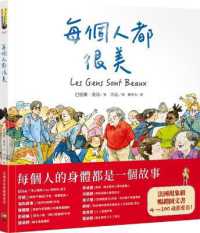Full Description
Creating New Families is intended to reflect the practice of the specialist, multi-disciplinary Fostering and Adoption team in the Child and Family Department of the Tavistock Clinic. The team is firmly rooted in an approach which values inter-disciplinary working for the contribution which the thinking of each discipline makes to the over
Contents
Series Editor's Preface -- Foreword -- Preface -- Introduction -- Theoretical Considerations -- A systemic conceptual framework -- Psychoanalytic framework for therapeutic work with looked-after and adopted children -- The "added value" of attachment theory and research for clinical work in adoption and foster care -- The uses of a neuroscientific perspective -- The role of psychiatric assessment and diagnosis -- Psychological assessment of looked-after children -- Psychotherapeutic Work with Children -- Work with children in transition -- Cognitive behaviour therapy -- Individual psychotherapy for late-adopted children: how one new attachment can facilitate another -- Where do I belong? Dilemmas for children and adolescents who have been adopted or brought up in long-term foster care -- Psychotherapeutic Work with Parents and Families -- Minding the gap: reconciling the gaps between expectation and reality in work with adoptive families -- Systemic work with families after adoption -- Kinship care: family stories, loyalties, and binds -- From tired and emotional to praise and pleasure: parenting groups for adoptive, foster, and kinship carers -- Consultative Work with Parents, Families, and Professionals -- Consultative work with professionals -- Therapeutic consultations about the transition into care and children in transition -- Contact with birth families: implications for assessment and integration in new families -- Work in Different Settings -- The contribution of organizational dynamics to the triple deprivation of looked-after children -- Children who cannot live in families: the role of residential care -- A Family's Perspective -- "Then there were four": learning to be a family








